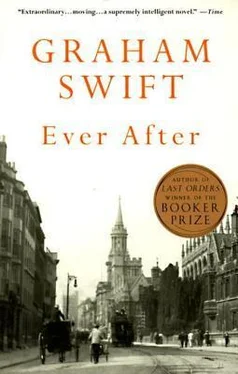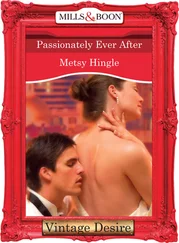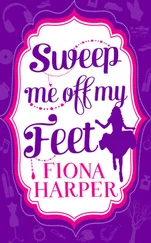She pulls me, by the socks, towards her. I am not going to play tug-of-war. But before I can disengage, she lets go of one sock, grabs my free hand with her free hand and jams it against her left breast. My crumpled sock is inadvertently trapped between my palm and her dress. Beneath both, I can feel something lacy, scratchy. The breast is soft and warm.
“You know why I came here, don’t you? It’s not the manuscripts, it’s—”
I pull my hand away. Perhaps I even take a virtuous step backwards. Her face seems about to undergo some further extraordinary transformation. To fall apart, perhaps. She spreads a hand (no longer possessed of a sock) across it, as if to hold it together.
“Oh God, I’m sorry. I’m sorry, Bill. I—”
Her throat is suddenly clogged with wordless gulps. She peers helplessly through her fingers.
“I’m truly sorry. Oh God. I wouldn’t have done it if — I mean — I mean — I wouldn’t have done it, anyway, if — if—”
But then tears start coming in great wrenching eruptions. She leans towards me. I drop my socks (I have them both now, one in each hand). Quite possibly, the pencil is still behind my ear. I step forward, put my arms around her. I feel her palm pressing on my back, her breasts on my ribs. A wet cheek on my cheek.
It’s strange, we are doing now, almost involuntarily, what a moment ago had been the object of intense, abortive machination. What’s more, I have this erection, a stiff, indomitable erection, and, though I try to be careful, she must feel it.
It’s her turn to pull away. “I think — I think I need that towel you were offering.”
And, trying to prevent me from seeing her face, she blunders first into my bedroom, then into the bathroom.
I don’t know what to do while she’s in the bathroom. I should make tea? Pour brandy? (I haven’t any brandy.) Say soothing things through the door, like some penitent seducer? I don’t know what will happen when she emerges. She will have regained a fragile composure and wish to leave? She will be minus her dress?
I pick up my socks, think of putting them on; then, as if putting them on would signal some sort of insensitivity, drop them again. I look at my notes strewn on the coffee table. I look at my bare, white feet. To be honest, for much of the preceding encounter, I have felt oddly like a mere manipulated dummy. Now I have the sensation (it’s not comfortable — it’s like some anaesthetic wearing off) of being dragged out of a state of suspended animation.
And I have this obstinate, towering erection. My body seems constructed around it.
A full minute passes. The plumbing (not medieval, but not up-to-the-minute) sings. I think: what state is my bathroom in? What horrors of male squalor? What scum in the bath?
But I quite forget one thing. When she comes out, she is neither composed nor naked. Her eyes are dry and puffed; but, rather than softened by a look of contrite, mustered dignity, the face is alert, suspicious, vaguely vindictive. It conveys a new sort of bewilderment, as if she, now, is the victim of some trick.
I smile imbecilically. What now?
“Well, you’re a sly one, aren’t you, Bill? But your visitors should be more careful — leaving their perfume in the bathroom.”
This takes me wholly by surprise. But, in the circumstances, it is absurdly proprietorial, absurdly accusatory — not to say wildly imaginative.
I think she realises this too, for she suddenly bites her lower lip, half closes her eyes, and her face is all an ominous quiver again.
What to say? I am bereft of inventiveness. It seems to me that the best thing to say is the truth. Perhaps it will be a way of getting me neatly, honourably out of all this.
(How wrong can you be?)
“Shall I tell you who that perfume belongs to? It belongs to Michael’s research student. Gabriella.”
She gives me a fierce, astonished, even more accusatory look.
“Her!”
“I can explain,” I say (feeling surprisingly guilty).
So I tell her about the events of that morning when I found myself a coerced passenger in Potter’s car. How I pocketed the perfume. Though I don’t tell her how I stalked the corridors of the Library, on a spring day, looking for a girl less than half my age (dressed in kittenish black), with ideas in my head as fantastical and concocted as the scent in my pocket.
All of which produces another convulsion of forgiveness-seeking, another welter of tears.
“Oh, I’m sorry, I’m sorry. I’m sorry. And you did it because of me . You’re— But I know about Gabriella. Of course I know about her. I know about them bloody all , don’t I?”
And then, as the tears subside, she begins to tell me, without announcing it, the full story of her life and hard times with Michael Potter (M.A., Ph.D.), beginning at the beginning, with that encounter, long ago, in a room in a university.
I listen. I fetch Kleenex. I make tea. We switch to something stronger. Dry sherry. College reserve. The academic tipple. The rain still thrums. My sitting-room is not furnished for intimacy — commiserative or otherwise. No sofa; two huge and dumpy armchairs which engirdle and engulf their occupants. A room meant, presumably, for learned, man-to-man debate, with much puffing and waving of pipes. We sit islanded from each other, Matthew’s Notebooks, like an impotent arbitrator, between us.
And it was her fault, you see. She thinks it was all her fault. (She has this way of being at fault.) It was even her job, at the BBC, that gave Potter his eventual entrée into real-live mediadom. But it would never have happened the way it did — she is sure of it — if they’d had a kid. Or two kids. She used to see famous names pass through the studio doors — more than once, it seems, she saw Ruth Vaughan passing through the studio doors — but what she wanted most then was a child. It wasn’t his fault. His machinery wasn’t faulty. (Or underused.) It was something wrong with her. Several tries. Several tests. Then, at last, by a fluke, it happens. She gives up her job to be a mother. But the thing is born prematurely and dies within hours, and it seems there won’t be a second chance. And within months Potter is messing around with a former colleague of hers, a TV producer called Lena (“Legs-up Lena”) — his new career is about to begin.
And she is left only with years of pretend marriage; of feeling that if she hadn’t walked through Potter’s door all that time ago with her notes for her long essay (chivalric nostalgia!), her life would have been a different thing; and of feeling, all the same, that it’s her fault, she is the one to blame — so much so that she even submits to this mad and self-recriminatory degree of ignominy, this exorcistic climbing of my staircase, as if she is returning full circle, to walk through the door again, to try to put it right.
The gas fire fizzes. John Pearce’s clock chimes — five, six o’clock. Her face is a smudged, reddened mess — she has first sobbed, then leaked tears. It makes a pitiable contrast with her dressed-to-kill outfit, as if one part of her is a discarded doll, the other an unmasked human being.
But something is happening as she speaks. Her face seems slowly to reassemble. Or rather, a new face, a face I have never seen before, seems to appear, as if something, some layer, some sad accretion, has been rinsed away. It is an extraordinary thing this, like watching some rare natural event, to see another person loom out of themselves.
She folds her legs beneath her on the chair (I’m not sure now that they don’t have verve), one hand clasping her ankles. She has abandoned her shoes. Her high heels, my grey socks, lie like the litter from some previous intimate encounter on the worn carpet. We are like young people. Provisional people. These college rooms. These conversations that have no end. As if we have gone back in time and this is us now, beginning.
Читать дальше












